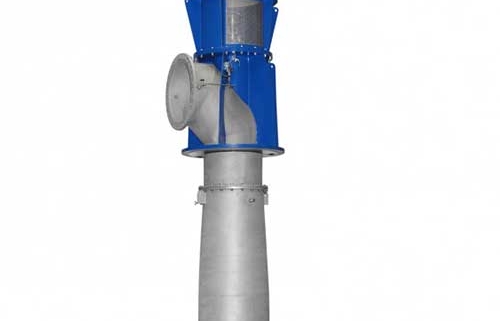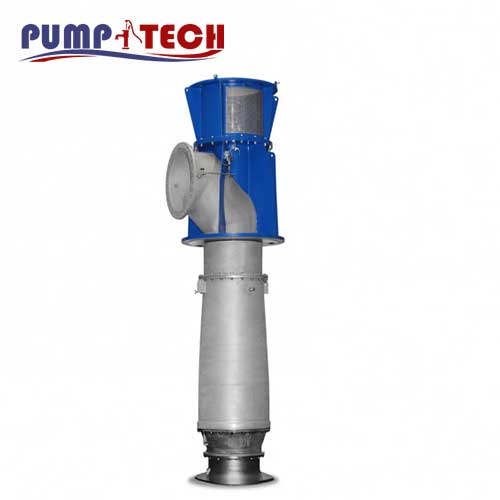

Main applications PNZ
- Cooling water and condensate
- Energy
- Flood / stormwater holding tanks
- Flood control
- Heat transfer, Cooling circuits
- Industrial waste water
- Industry engineering
- Lake, Damwater extraction
- Municipal waste water
- Nuclear Power Stations
- Power Stations < 100 MW
- Power Stations > 100 MW
- Sea -& Riverwater Extraction
- Special processes
- Turbine Island
- Waste water
- Water
- Water Extraction
- Watertransport
Design PNZ
Vertical tubular casing pump with axial propeller. Pump inlet with bellmouth or suction elbow, pull-out design available, discharge nozzle arranged above or below floor, flanges to DIN or ANSI standards available.
Application pump PNZ
Handling of raw, pure, service and cooling water in industry, water supply systems, in power stations and seawater desalination plants.
Variants pump PNZ :
pull-out or non-pull-out.
KSB’s tubular casing pumps can be supplied in two design variants.
The pull-out design is easier to service and maintain: During
dismantling and re-assembly, thae entire rotor can be withdrawn
for inspection and maintenance. This minimises downtime for
maintenance work and reduces life cycle costs (LCC).
By contrast, the investment for non-pull-out type pumps is
considerably lower because a number of components can be
dispensed with. This reduces both the weight of the pump and
the initial costs.
Desing Details pump PNZ
three options to boost efficiency.
Pre-swirl control
Controlling the approach flow to the impeller by means of pre-swirl control equipment is particularly suitable for applications involving significant variations of head in combination with a relatively constant rate of flow, for example to compensate for tidal flow or for combined operation (cooling tower/fresh water).
The pre-swirl controller can be adjusted either during pump operation or during a standstill. Pre-swirl control equipment will considerably improve pump efficiency at any discharge head and flow rate, and make the pump run more smoothly.
Blade pitch adjustment
Blade pitch adjustment is the control method of choice for pumping conditions characterised by minor changes in head and major variations in flow rate. The infinitely variable blade pitch angle can either be adjusted by means of an electro-mechanical adjustment gear or manually. With either method, it does not matter whether
the pump is running or not. The operating point can be precisely adjusted to achieve the best possible efficiency
Speed control
Speed control is ideally suited for systems characterised by fluctuating flow rates and high energy costs. Variable speed systems can be used in all applications where the pump driver is either an electric motor or a diesel engine.
Speed control is the best method of “fine-tuning” the pump so that it runs at its best efficiency point
Overview of technical data PNZ
| Q (50Hz) | 5,000.0 – 65,000.0 (m³/h) |
| H (50Hz) | 7.0 – 15.0 (m) |
| Type of bearing | Rolling element and plain bearings |
| Casing partition | Radially split |
| Drive frequency | 50 Hz /60 Hz |
| Type of drive | Electric motor |
| Drive voltage | Low voltage, high voltage |
| No. of impeller entries | Single entry |
| Type of installation | Long-coupled |
| Type of coupling | Direct, Gear |
| Type of lubrication | Oil / Product lubrication |
| Max. permissible fluid temperature | 80.0 (°C) |
| Maximum operating pressure | PN 6, PN 9 |
| Pump set location | Wet well |
| Suction characteristics | Non-priming |
| Type of casing | Tubular casing |
| Type of impeller | Axial, Propeller |
| Type of connection | Flange |
| UNSPSC classification | 4015150300 |
| eClass assignment | 36410000, 36410106, 36410100 |
| Installation position | Vertical |
| Shaft seal type | Gland packing, Mechanical seal |
| Main applications | Waste water / sewage, Energy, Water |
| Casing material | Carbon steel, Duplex steel, Chrome nickel steel |
| Type of installation | Stationary |
| Maximum speed of rotation | 990.0 (1/min) |



